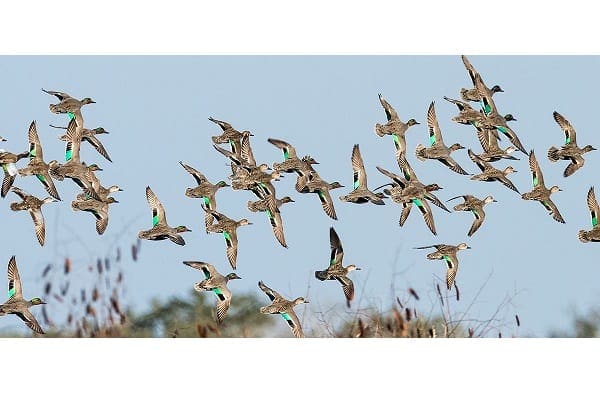Saturday, May 9, is World Migratory Bird Day

MEMPHIS, Tennessee – May 8, 2020 – May is American Wetlands month and as duck nesting season gets underway across North America, Ducks Unlimited and the rest of the world will celebrate World Migratory Bird Day (WMBD) on Saturday, May 9.
“Every year, World Migratory Bird Day brings awareness to conserving migratory birds and their habitats all over the world,” Ducks Unlimited Chief Executive Officer Adam Putnam said. “Ducks Unlimited works every day to conserve, restore and manage wetlands and associated habitats for North America’s waterfowl. DU’s conservation work benefits hundreds of species of migratory birds in addition to waterfowl, including some species whose populations are struggling.”
The conservation theme for this year’s World Migratory Bird Day is “Birds Connect Our World,” and was chosen to highlight the importance of conserving and restoring the ecological connectivity and integrity of ecosystems that support the natural movements of migratory birds and that are essential for their survival. Ducks Unlimited, among the world’s longest tenured and most successful nonprofit conservation organizations, has been conserving critical habitat for waterfowl since 1937. That work has helped to conserve and restore fragile wetlands and associated upland ecosystems that more than 900 species of wildlife, including hundreds of bird species, depend on.
The importance of migratory bird conservation is more real now than ever before, as was noted last fall in the report “Decline of North American avifauna” published in the journal Science, and then covered again in a related article in the New York Times article The Crisis for Birds Is a Crisis for Us All.
The report showed evidence of a widespread loss of nearly 3 billion birds since 1970 – alarming not just for the United States, but for all of North America and the entire planet. While the report did not explore causes, it is clear that loss of habitat is central to the discussion and conservation efforts should be a particular area of focus if we hope to reverse this trend.
The Science report correctly pointed out that waterfowl populations are up 56 percent since the 1970s – a testament to the hard work of DU members and other waterfowl hunter-conservationists to restore and protect habitat for the birds that are so important to our natural resource heritage.
On a personal level, there are several ways to help migratory birds and support conservation. Join or donate to Ducks Unlimited or another conservation organization. Volunteer for organizations that conserve habitat and help birds. Restore natural habitat on your property or in your community and cultivate native plants that provide food, nest sites and cover for birds.
One of the best ways to support migratory birds and wetland conservation in the U.S. is to buy a Migratory Bird Hunting and Conservation Stamp, commonly known as the federal duck stamp.
“There are many great reasons to buy duck stamps,” said DU Chief Conservation Officer Karen Waldrop. “A federal duck stamp is required to legally hunt migratory waterfowl in the United States. Beyond that, a duck stamp covers the entrance fees and provides important funding for our national wildlife refuges, which benefits everyone. Duck stamp funding is used to acquire or protect habitat for hundreds of species of migratory birds, not just waterfowl, so all birding enthusiasts should buy them to support this worthy cause. Whatever your reason for purchasing duck stamps, buy a couple of them each year to benefit waterfowl and support conservation-based sporting traditions, which is definitely in the spirit of World Migratory Bird Day.”
Visit http://www.worldmigratorybirdday.org/ for more information about World Migratory Bird Day.
For more information visit www.ducks.org. Follow DU’s newest Twitter feed – @DUNews1937 – to get the most up-to-date news from Ducks Unlimited.
Ducks Unlimited Inc. is the world’s largest nonprofit organization dedicated to conserving North America’s continually disappearing waterfowl habitats. Established in 1937, Ducks Unlimited has conserved more than 14.5 million acres thanks to contributions from more than a million supporters across the continent. Guided by science and dedicated to program efficiency, DU works toward the vision of wetlands sufficient to fill the skies with waterfowl today, tomorrow and forever. For more information on our work, visit www.ducks.org.
